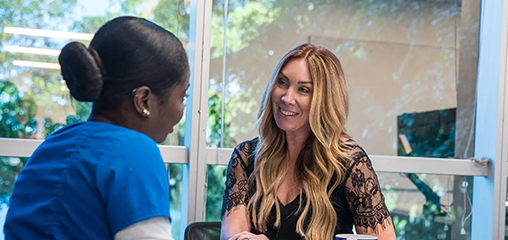
Are you thinking about pursuing a career in pediatric nursing? While a truly rewarding field, becoming a pediatric nurse requires a unique set of skills beyond what you would use with adult patients. It’s not just about smaller doses and tiny equipment but about understanding how to care for a developing human.

“Choosing pediatric nursing was never just a career decision, it was a calling fueled by my passion for advocating for pediatric patients and ensuring they receive the highest quality care during the most critical stages of their development. The resilience, strength, and spirit children show in the face of illness inspires me every single day, and I’m committed to supporting their journey toward becoming healthy, thriving adults,” said Adrienne Wallace, DNP, MSN, APRN, CPNP-PC, RN, Assistant Adjunct Professor at Arizona College of Nursing’s Aurora Campus.
Here’s a look at the essential skills you will need if you want to be a great peds nurse.
Understanding Pediatric-Specific Clinical Skills
First, it is important to remember that a baby isn’t a miniature adult. From vital signs to pain scales, everything changes based on age. You need to remember developmental milestones and what is normal for a 6-month-old vs a 6-year-old. This means being able to:
Take Vital Signs
A normal heart rate for an infant can be 160 bpm, while a child’s might be 100. Knowing the correct ranges for different ages is critical. Medication errors in pediatrics can have devastating consequences. This is where your foundational pharmacology knowledge becomes critical. It’s not just about memorizing formulas; it’s about double-checking everything and paying great attention to detail.
Assess Pain
Kids don’t always have the ability to tell you how they feel. They may be irritable, clingy, or refuse to eat/drink. You will need to master age-specific pain scales like the FLACC (Face, Legs, Activity, Cry, Consolability) scale for nonverbal children or the Wong-Baker FACES Pain Rating Scale for older kids.
Time Management
As a nurse, you must be able to juggle your administrative tasks with patient care. This can be especially true for pediatric nurses as kids are a whole different kind of patient population ready to throw anything at you and play by their own rules.
Mastering Communication and Trust-Building with Young Patients
Beyond these skills, the heart of a pediatric nurse is what truly makes the difference. When working with kids, you need to have empathy and patience, as caring for sick children and their families is emotionally demanding.
Some ways you can communicate more effectively with your pediatric patients and gain trust is to:
Think Before You Speak
The way you talk to a teenager about their health is completely different from how you would explain a procedure to a preschooler. Pediatric nurses must be master communicators, using simple language, patience, and sometimes even things like toys to help build trust with their patients to get the information they need.
Get on Their Level – Literally
A lot of pediatric nurses find it helpful to get down to their pediatric patient’s eye level when talking. Sit in a chair, kneel on the floor, or stand a respectful distance away, as physical positioning can make you feel less intimidating to a child. It also allows you to observe their non-verbal cues more easily, which can easily tell you a lot about how they are feeling.
Use the Power of Play
Therapeutic play is a common tool for pediatric nurses. For a preschooler, you might use a teddy bear to demonstrate how an IV will be placed. For a school-age child, you might let them listen to their own heartbeat with your stethoscope. This technique turns a scary procedure into a manageable experience and gives the child a sense of control.
Become a Master of Distraction
Your job is to keep a child’s attention on something other than a needle stick or a blood draw. This may be their favorite song, a funny video, a light-up toy, or anything else that can distract them. The ability to divert a child’s focus is a skill that takes practice but is invaluable in preventing a traumatic experience.
Embracing Family-Centered Care
Perhaps the biggest thing to remember during your path to becoming a pediatric nurse is to embrace family-centered care. Your patient is never just the child, but the entire family. You will have to build a rapport with the anxious family and caregivers, keeping them informed, answering any and all questions, and involving them in the care plan. Your job is to be an advocate for the child and a reassuring presence for the family.
“Equally important to me is sharing this passion with future nurses. I love teaching others about the unique rewards and challenges of pediatric nursing, and I strive to encourage new nurses to consider this specialty as a meaningful and impactful path within the profession. Watching them discover their own passion for caring for children is one of the most fulfilling parts of what I do,” added Wallace.
If you have the right amount of compassion, creativity, and communication skills, a career in pediatric nursing may be the perfect fit for you. Caring for children, from newborns to teenagers, can be extremely rewarding as you will serve as the advocates for a vulnerable population. Like any healthcare job, you will be faced with challenges and hard days. Still, there is so much more to pediatric nursing than meets the eye.
Start Your Future in Nursing Today

If you’re considering a career as a registered nurse (RN), Arizona College of Nursing is here to help you pursue your dream. Our BSN program enables you to earn a Bachelor of Science in Nursing in just 3 years or less with qualifying transfer credits. We’ve helped hundreds of students to earn a BSN degree and enter the nursing profession – and we’re ready to support you on your path to becoming an RN.
Why Choose Arizona College of Nursing?
- Earn a BSN degree in 3 years or less with eligible transfer credits
- Campus locations throughout the US
- Night classes for general education courses
- Hybrid Online/In-Person format for general education classes
- Nursing education is all we do
- CCNE-Accredited Program*
- NCLEX-RN success coaches and exam preparation class
- Financial aid available to those who qualify
Discover Your Path to a Career in Nursing
Information in this post is accurate as of October 6, 2025.
*The Bachelor of Science in Nursing (BSN) degree program at Arizona College of Nursing is accredited by the Commission on Collegiate Nursing Education (https://www.aacnnursing.org/). All Arizona College of Nursing and Arizona College campuses are institutionally accredited by the Accrediting Bureau of Health Education Schools (https://www.abhes.org/), a U.S. Department of Education-recognized accrediting agency.








